Despite early-stage virtual reality market and augmented reality market valuations softening in a transitional period, total global AR/VR startup valuations are now at $45 billion globally — include non-pure play AR/VR startups discussed below, and that amount exceeds $67 billion. More than $8 billion has been returned to investors through M&A already, with the remaining augmented and virtual reality startups carrying more than $36 billion valuations on paper. Only time will tell how much of this value gets realized for investors.
(Note: this analysis is of AR/VR startup valuations only, excluding internal investment by large corporates like Facebook. Again, this analysis is of valuation, not revenue.)
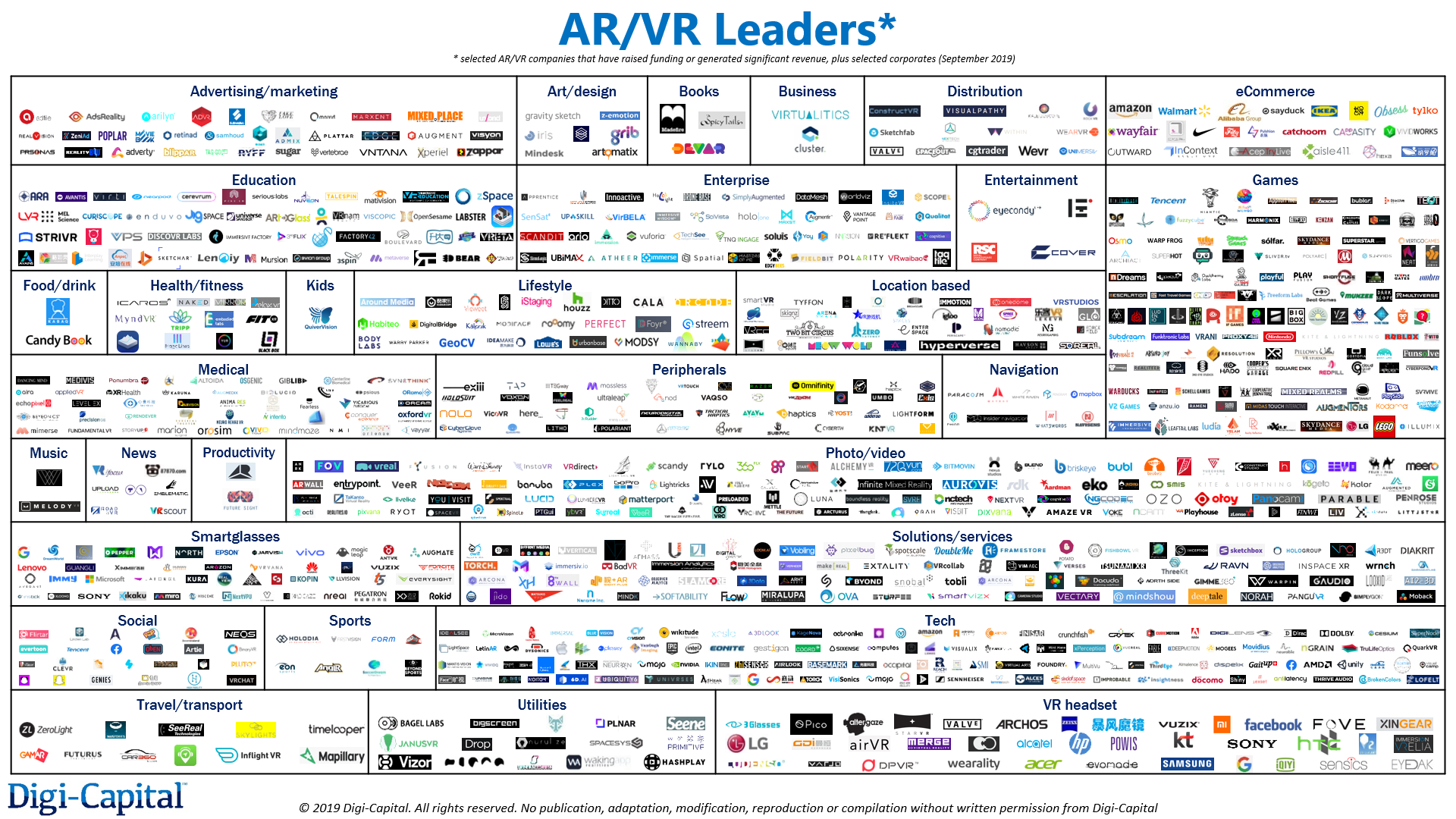
There is significant value concentration, with just 18 AR/VR pure plays accounting for half of the $45 billion global figure. Some of the large valuations are for Magic Leap (well over $6 billion), Niantic (nearly $4 billion), Oculus ($3 billion from exit to Facebook), Beijing Moviebook Technology ($1 billion+) and Lightricks ($1 billion). While there are unicorns, the market hasn’t seen an AR/VR decacorn yet.
Across all industries — not just AR/VR — around 60% of VC-backed startups fail, not 90% as often quoted. That doesn’t mean this many startups crash and burn, but that 60% of startups deliver less than 1x return on investment (ROI) to investors (i.e. investors get less back than they put in). To better understand what’s happening in AR/VR, let’s analyze the thousands of startup valuations in Digi-Capital’s AR/VR Analytics Platform to see where the smart money is by sector, stage and country.
Do what you can, with what you have, where you are
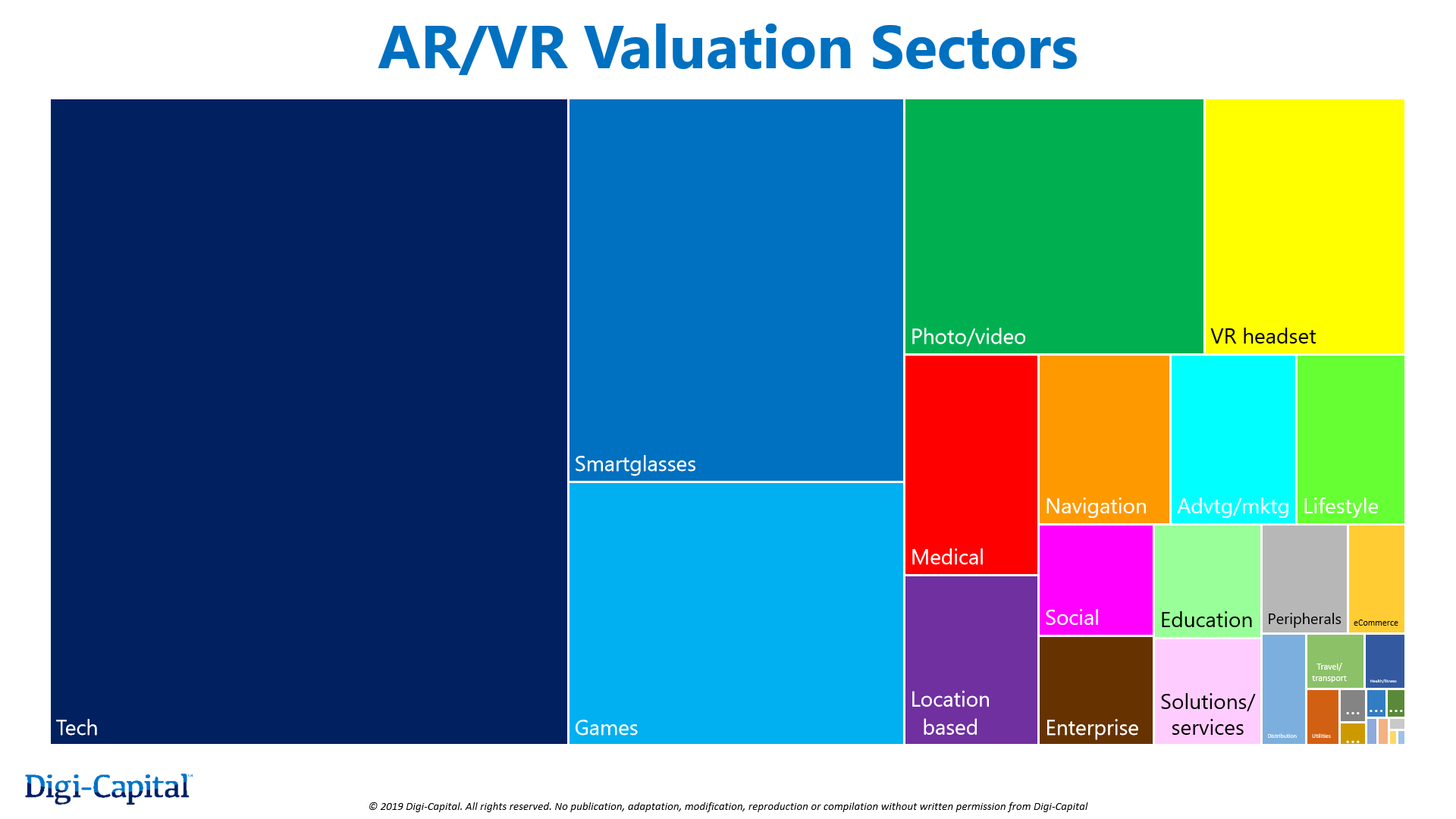
A rising tide lifts all boats, while an ebb tide reveals the rocks beneath the waves. Similarly, the AR/VR industry sectors in which startups operate have a big impact on how they deliver value. Across the 30+ AR/VR sectors that Digi-Capital tracks, some sectors appear to be more equal than others.
Core AR/VR tech startups have delivered the most value to date, with “picks and shovels” businesses supporting the entire market while avoiding customer risk in any one sector. The largest valuations are for core tech companies that operate across either augmented reality and computer vision markets (particularly in China), or games and AR/VR markets. These startups are not AR/VR pure plays, showing how revenue diversification can be highly valuable in early stage markets.
Smartglasses make up the next AR/VR sector in terms of valuation, with around two-thirds of that locked up in smartglasses platform company Magic Leap (again, this analysis is of startups only, excluding internal corporate investment like Microsoft mixed reality).
VR headsets come in at number three, due to Facebook’s acquisition of Oculus back in 2014. While that deal was arguably the catalyst for the current wave of AR/VR, other VR headset startups haven’t delivered similar levels of value to investors yet.
AR/VR games follow, with startup valuations dominated by Pokémon Go developer Niantic and smaller exits like Osmo. AR/VR photo/video is next, with a large chunk of that value having been realized for investors through exits such as Shenzhen Lianmeng Technology, Replay Technology and Magic Pony Technology. There are also ongoing startups like Goldman Sachs-backed Lightricks.
The long tail of 25 other AR/VR market sectors each make up a decreasing proportion of remaining startup valuations today. There are individual later-stage startups such as Beijing Moviebook Technology in AR/VR categories like social, but these are in the minority today (Note: this does not mean there isn’t significant value across remaining sectors or companies within them, but that value has not been quantified by exit value or investment round valuations yet).
All the world’s a stage
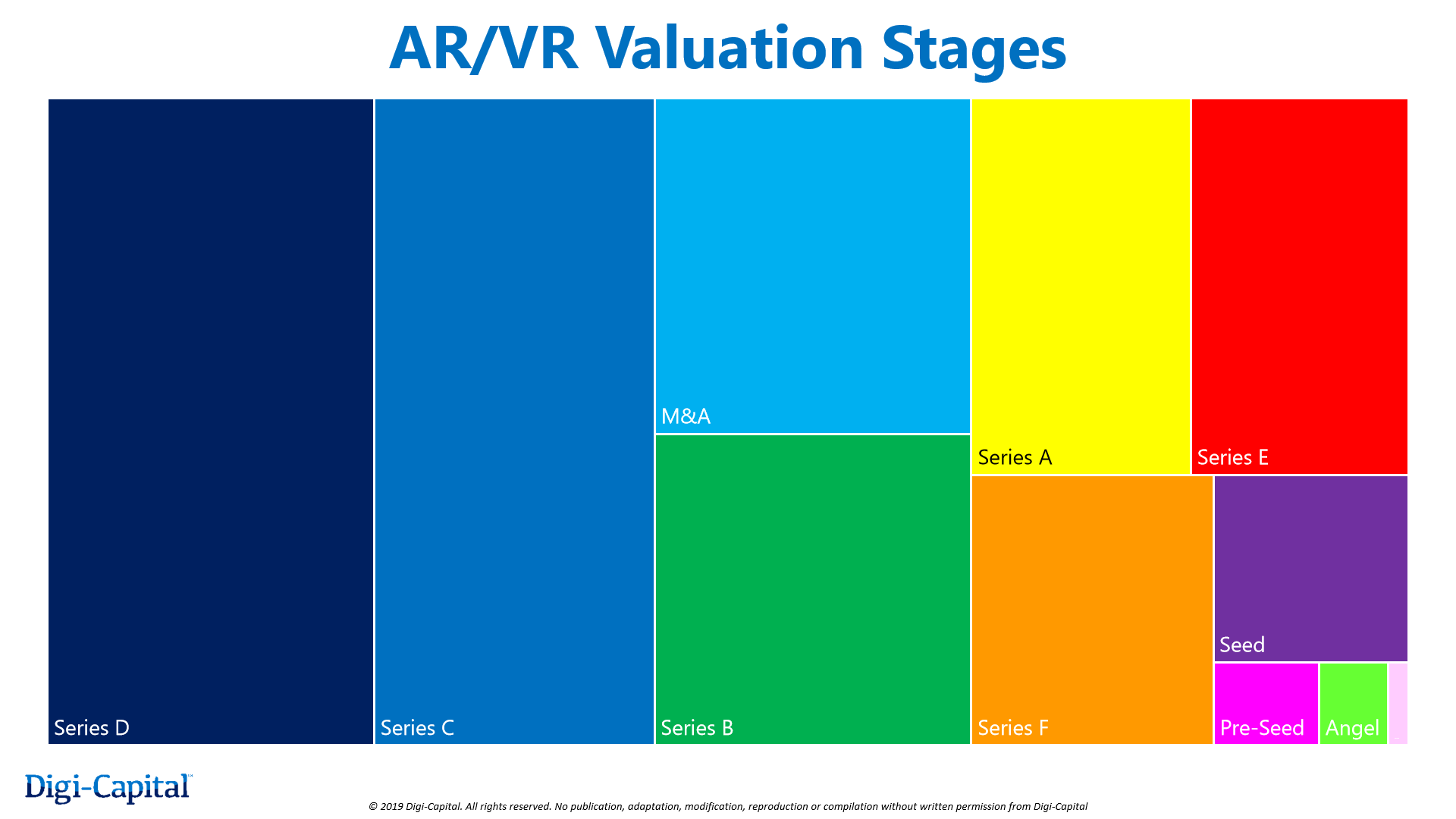
The highest valuations on paper tend to be in later-stage startups for most tech markets, so it’s no surprise that companies at Series D and Series C stage in China and the USA make up around 45% of valuations in today’s AR/VR market. In terms of realized returns to investors, M&A has delivered over 12% of total global value. While the $3 billion Oculus exit to Facebook back in 2014 stands out, there have been a significant number of exits over the $100 million mark since that time.
When looking at all the different investment stages from Angel through to Series F, their valuation order is slightly jumbled. Series B, A, E and F (in that order) are a similar order of magnitude, followed by Seed, Pre-Seed, Angel and Accelerator at a much lower level. This is a product of the number and valuation of individual startups in each of these stages.
It’s a small world after all
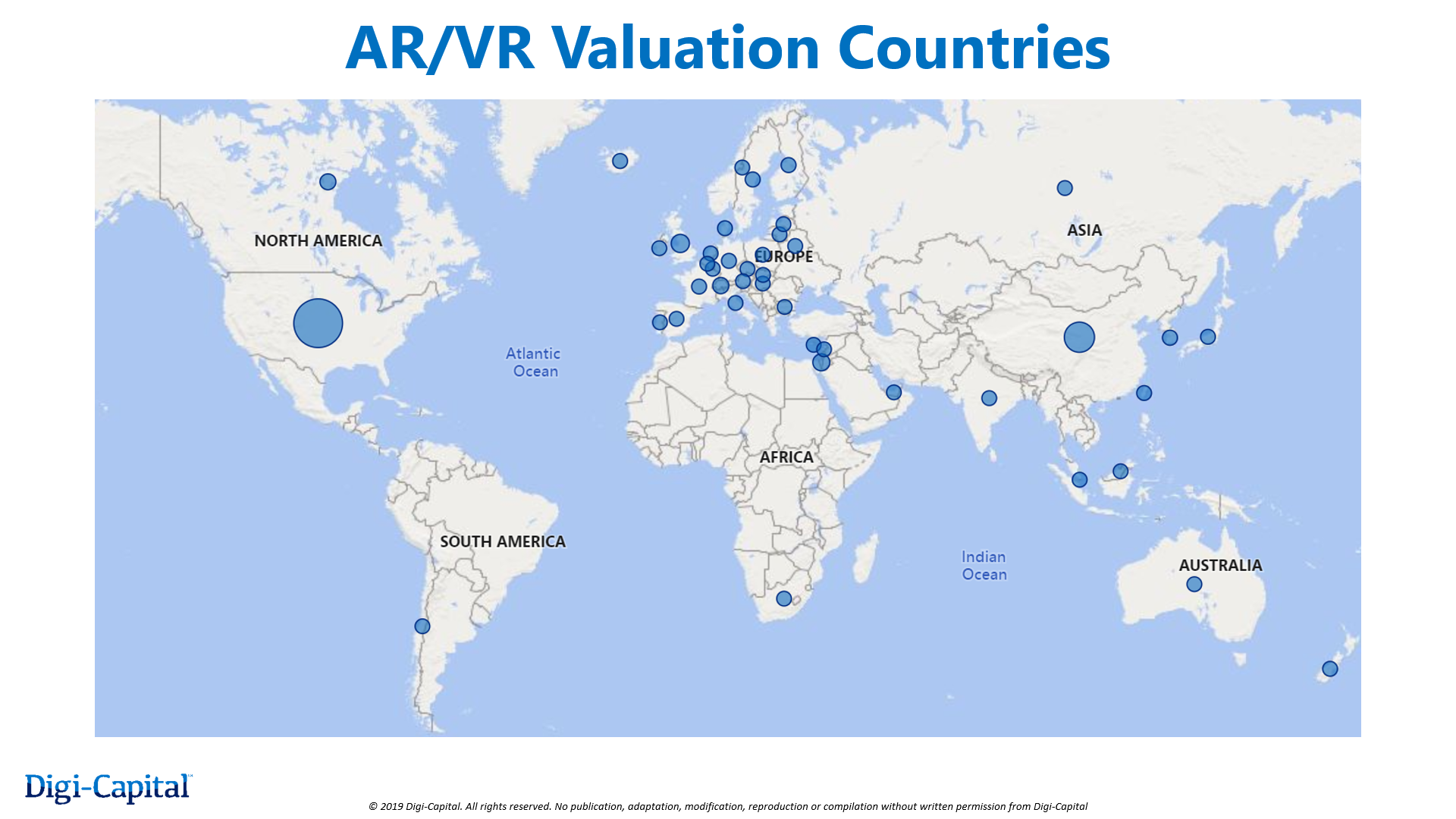
The geographic distribution of value in AR/VR is extreme, with the USA and China accounting for more than 80% of all AR/VR startup valuations worldwide. These are followed at a much lower level by the UK, Israel, Switzerland and Canada, with a long tail of around 50 other countries. At the regional level, the running order is North America, Asia and Europe, with Latin America and MEA making up the balance. It’s worth noting that while a lot of stored valuation has been in US startups historically, Chinese AR/VR startups have raised far more money in recent years. However, Chinese VC investment dropped dramatically this year across sectors — not AR/VR specifically.
A journey of a thousand miles begins with a single step
Augmented reality, virtual reality and mixed reality (XR) remain early stage, with both consumer and enterprise markets looking for an inflection point to help them truly scale. During a transitional period with many VC and corporate investors taking a wait-and-see approach, startups might need to focus on generating revenue and controlling costs rather than seeing VC funding rounds and exits delivering valuation/value increases. This could end up being a good thing in the long run, as the strongest AR/VR startups rise to the top. For those that do, there’s a lot more value to come.
Tim Merel is Managing Director of AR/VR adviser Digi-Capital, and is a software engineer, investment banker, lawyer and founder.
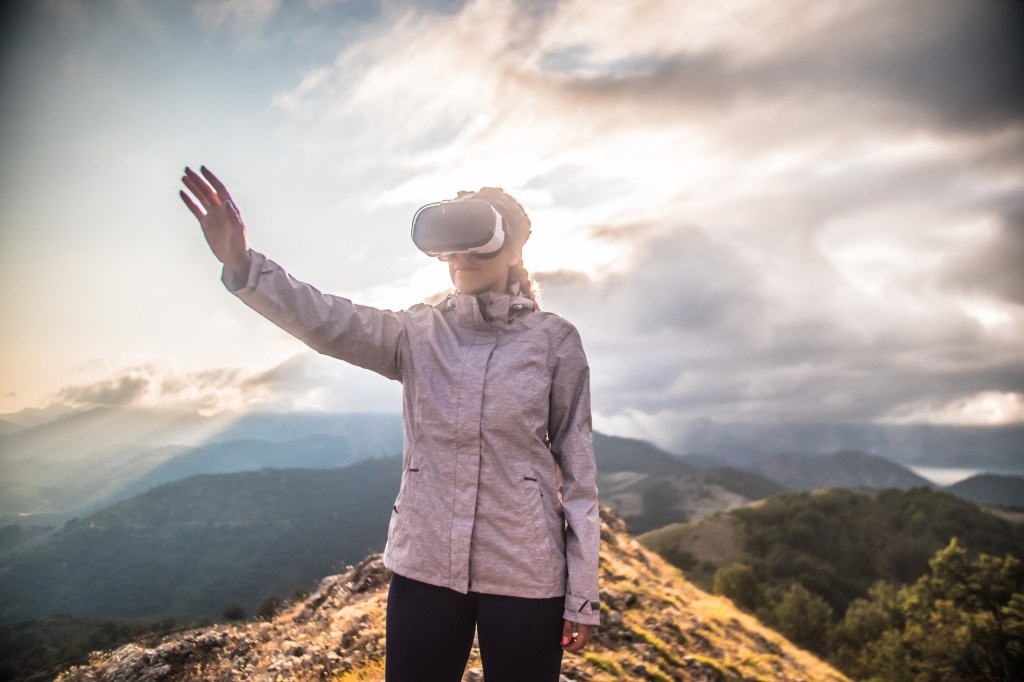






























Comment